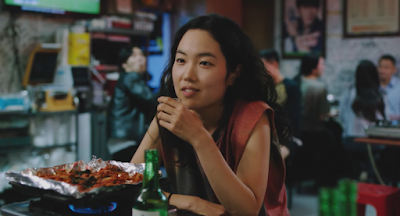Early in “Return to Seoul,” Frédérique “Freddie” Benoît (Park Ji-min), a Korean adoptee raised in France, tells a couple new friends about her ability to sight-read music, to simply sit down at a piano, pick up sheet music, and play, and to do it without fear. To demonstrate this ability, she gets up from the table and goes about rearranging tables in the small joint, encouraging various strangers in the place to switch seats and sit next to one another, like you might in some corporate mandated training exercise, three small outings of friends suddenly becoming one large party of friendly strangers with Freddie as facilitator. It’s a wild, unexpected way of establishing a wild, unexpected character, one who may or may not have returned to Seoul to seek out her adoptive parents, it’s hard to say, because director and writer Davy Chou eschews explanation for energy and emotion, a person charting her path sight-unseen, sitting down at the piano of life and just playing. So often a director, or a screenplay, dictates a character’s journey, but kind of in the vein of the miraculous American indie “Ruby in Paradise,” “Return to Seoul” is guided by its character, the movie itself sometimes deliberately feeling as if it is struggling to keep up with her.
Freddie might have been raised in France, but “Return to Seoul” never sets foot there, sticking almost strictly to the South Korean capital. Yet, she speaks French, or occasionally American, never Korean, meaning that in conversations with her biological father (Oh Kwang-rok) have to be translated. If she is counseled by the adoption agency to first immerse herself in the Korean culture before reaching out to and meeting her biological folks, the opening scene in which Freddie brazenly eschews the Korean custom to let someone else pour Soju for her when she has an empty glass puts into perspective her attitude toward such advice, evincing a purposeful kind of dislocation with this place where she is ostensibly seeking a connection. The movie’s assortment of flash-forwards, each one in terms of years rather than days or weeks, further that displacement as opposed to bringing clarity, underlined in her evolving lines of employment, from fancy international relations gig to a literal weapons dealer. In eschewing any sort of context to these occupations, their heightened nature, especially the latter, come across like a hysterically dark joke on mankind’s tendency to define itself through career. That black comedy comes through, too, in a brief sequence where Freddie is briefly glimpsed on a backpacking trip, familiar shorthand for a spiritual quest, juxtaposed against a moment in which she sends a text of nominal profundity from the toilet.
“Return to Seoul” suggests a film of awakening self-identity, but the way Freddie cites hatred of her own birthday effuses an almost antagonistic attitude toward that identity, those flash-forwards continually throwing her own sense of self back up for grabs, like the indelible moment in the back of a taxi where even before she essentially bids the French boyfriend (Yoann Zimmer) we have hardly even gotten to know goodbye forever, you see her decide to bid goodbye in this flash of positively wicked delight that lights up her eyes. Chou cuts directly from this moment to Freddie waking up sprawled in an alley. If the cut would seem to imply this occurs immediately after their break-up, who’s to say, and I thought of the end of the second season of “Alias” when Jennifer Garner’s spy extraordinaire wakes up in an alley in Hong Kong, unsure how she got there. Of course, “Alias,” in the manner of the serialized TV show it was, spent a whole season piecing the missing plot together, but just as Freddie picks herself up, dusts herself off, and gets on with it, so does “Return to Seoul,” sight-unseen. So many movies seeking to posit chicken scratch emotional journeys still tend to follow familiar narrative roadmaps, but “Return to Soul” honors its character by swerving all over that map, and if we never quite get inside Freddie’s head, it’s only because she’s guided by something else entirely, a feeling, evoked in the scene where she dances on her own.
Park Ji-min’s movement in this moment is astonishing, virtually possessed, as if she’s running at a silent movie-appropriate 16 frames per second independent of the movie’s own modern frame frate, and embodying the song’s dueling lyrics about both not needing anybody and not wanting to be alone, unknowable, unreadable, and utterly alive.




No comments:
Post a Comment